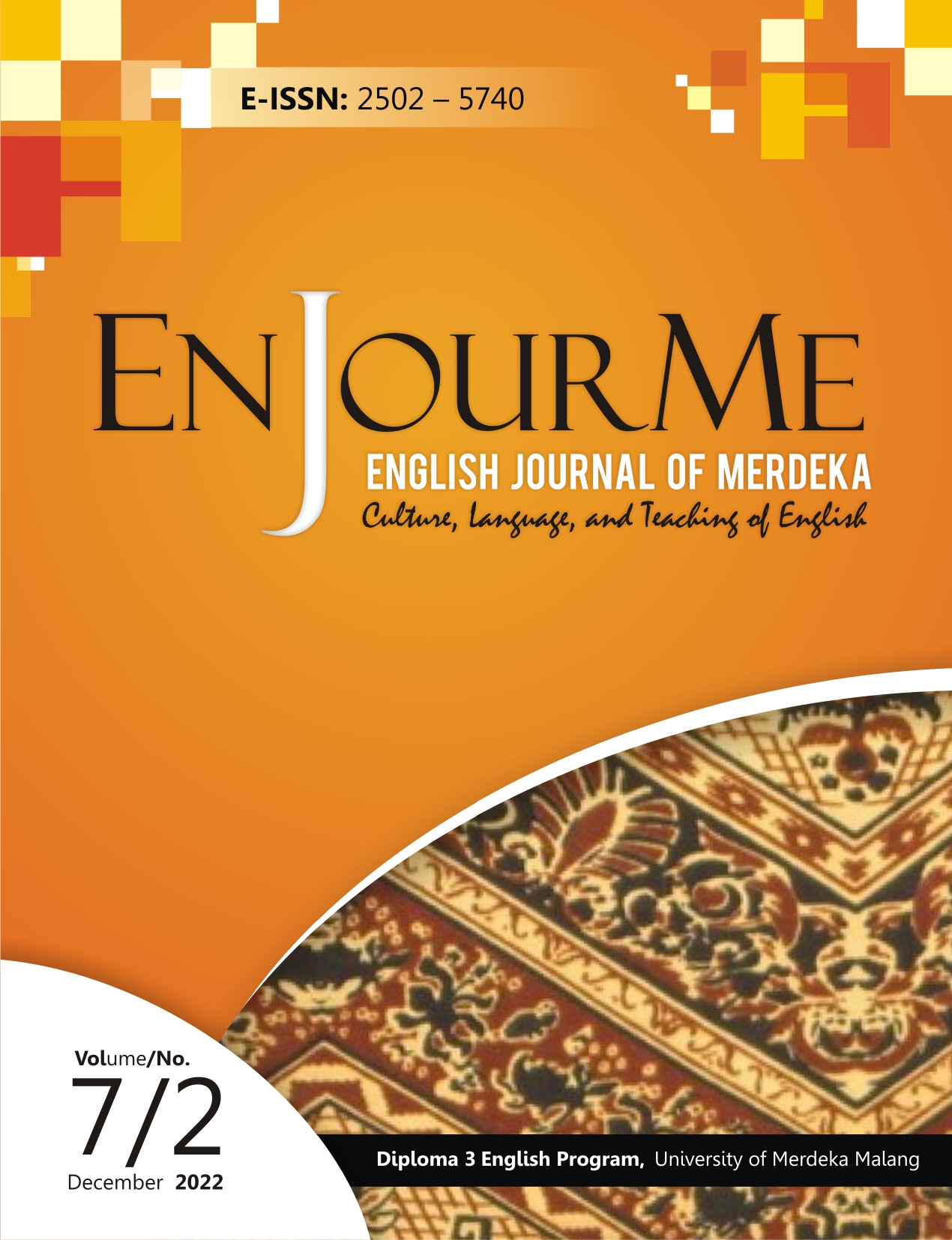R&D study on materials adjustment for Basic Listening course
DOI:
https://doi.org/10.26905/enjourme.v7i2.8738Keywords:
COVID-19 Pandemic, listening course, Internet technology, material adjustmentAbstract
Due to the last two year Covid-19 Pandemic, the teaching learning activities were globally switched, from offline to online learning. This happened at University of Merdeka Malang, too. One of the researchers, who taught Basic Listening course at Diploma Three English Program, had to change language laboratory activities into synchronous and asynchronous activities. Inevitably, it was resulted in the teaching materials as well. The objective of this R&D study is to propose the use of Internet technology through selected videos in the YouTube Channel to partially adjust the existing teaching materials in the above mentioned course. As the primary instruments, the researchers adapted the framework of Graves’ materials development and used questionnaires as the secondary instruments. Graves’ framework consists of seven components of course development processes, however, the researchers did not use or apply them all (only Steps 4, 5 and 6) since they just made partial adjustment to the existing materials usually used during the offline class. The finalproducts of this study were in the form of softcopy files given to the students as handouts.   Â
DOI:Â 10.26905/enjourme.v7i2.8738
Downloads
References
Ahmadi, D., & Reza, M. (2018). The use of technology in English language learning: A literature review. International Journal of Research in English Education, 3(2), 115-125.
Ary, D., Jacobs, L. C., Irvine, C. K. S., & Walker, D. (2002). Introduction to research in education, Sixth Edition. Belmont, CA: Wadsworth Group/Thomson Learning.
Bogdan, R.C., & Biklen, S.K. (2007). Qualitative research for education: An Introduction to Theories and Methods. Pearson Education, Inc.
Brown, H. D. (2007). Teaching by principles: An Interactive Approach to Language Pedagogy. New York: Pearson Education, Inc.
Dhaifi, I. (2020). Studi analisis dampak pademi Covid-19 terhadap eksistensi pembelajaran Pendidikan Agama Islam di Indonesia. Edupedia: Jurnal Studi Pendidikan dan Pedagogi Islam. 5(1), 45-53. Retrieved from https://journal.ibrahimy.ac.id/index.php/edupedia/article/view/880
Farani, Y. (2016). The proposed culturally rich instructional materials of integrated oral course for the Fifth semester students of D3 English Program at University of Merdeka Malang. EnJourMe (English Journal of Merdeka): Culture, Language, and Teaching of English, 1(1), 1-16. https://doi.org/10.26905/enjourme.v1i1.277
Farani, Y. (2017). ESP Business English: The proposed students’ workbook used for eaching Bahasa Inggris Bisnis at D3 Accounting of Economics & Bussiness Faculty at UNMER Malang. EnJourMe (English Journal of Merdeka): Culture, Language, and Teaching of English, 2(1), 61-71. https://doi.org/10.26905/enjourme.v2i1.631
Farani, Y., & Yustisia, K. K. (2021). Developing Speaking section of Business English materials to teach culture in integrated way. Journal of Applied Linguistics and Literature, 6(1), 162-176. https://doi.org/10.33369/joall.v6i1.11608
Firman, F. (2020). Dampak covid-19 terhadap pembelajaran di perguruan tinggi. BIOMA: Jurnal Biologi Dan Pembelajarannya, 2(1), 14-20.
Gall, M.D., Gall, J.P., & Borg, W.R. (2003). Educational Research. Seventh Edition. Boston: Pearson Education, Inc.
Gilakjani, A. P. (2017). English pronunciation instruction: Views and recommendations. Journal of Language Teaching and Research, 8(6), 1249-1255. https://doi.org/10.17507/jltr.0806.30
Graves, K. (1996). A framework of the course development process. In Graves, K. (Ed.): Teachers as Course Developers, (pp. 1-11). New York, NY: Cambridge University Press.
Harmer, J. (2007). The practice of English language teaching. Fourth Edition. UK: Ashford Colour Press Ltd.
Larsen-Freeman, D., & Anderson, M. (2011). Techniques and principles in language teaching. 3rd Edition. Oxford University Press.
Latief, M.A. (2010). Tanya jawab metode penelitian pembelajaran bahasa. Malang: Penerbit Universitas Negeri Malang.
Putra, P., Liriwati, F. Y., Tahrim, T., Syafrudin, S., & Aslan, A. (2020). The students learning from home experience during covid-19 school closures policy in Indonesia. Jurnal Iqra, 5(2), 30–42. https://doi.org/10.25217/ji.v5i2.1019
Siahaan, M. (2020). Dampak pandemi Covid-19 terhadap dunia pendidikan. Jurnal Kajian Ilmiah. Edisi Khusus, 1, 1-3. DOI: https://doi.org/10.31599/jki.v1i1.265
Sejdiu, S. (2017). Are listening skills best enhanced through the use of multimedia technology. Digital Education Review, 60-72. https://doi.org/10.1344/der.2017.32.60-72
Wang, Z. (2015). An analysis on the use of video materials in college English teaching in China. International Journal of English Language Teaching, 2(1), 23-28. https://doi.org/10.5430/ijelt.v2n1p23, 2015
Wediyantoro, P. L., Lailiyah, M., & Yustisia, K. K. (2020). Synchronous discussion in online learning: Investigating students’ critical thinking. EnJourMe (English Journal of Merdeka): Culture, Language, and Teaching of English, 5(2), 196-203. DOI: 10.26905/enjourme.v5i2.5205
____ (2020). Indonesia Dorong UNESCO Prioritaskan Pendidikan dalam Hadapi Covid-19. Retrieved from https://kemlu.go.id/paris/en/news/7452/indonesia-dorong-unesco-prioritaskan-pendidikan-dalam-hadapi-covid-19#
____ (2020). UNICEF Indonesia: Untuk Setiap Anak. Retrieved from https://www.unicef.org/indonesia/id/press-releases/covid-19-laporan-baru-unicef-mengungkap-setidaknya-sepertiga-anak-sekolah-di-seluruh
Additional Files
Published
How to Cite
Issue
Section
License
Authors who publish with this journal agree to the following terms:
(1) Copyright of the published articles will be transferred to the journal as the publisher of the manuscripts. Therefore, the author confirms that the copyright has been managed by the journal.
(2) Publisher of EnJourMe (English Journal of Merdeka) : Culture, Language, and Teaching of English is University of Merdeka Malang.
(3) The copyright follows Creative Commons Attribution–ShareAlike License (CC BY SA): This license allows to Share — copy and redistribute the material in any medium or format, Adapt — remix, transform, and build upon the material, for any purpose, even commercially.




